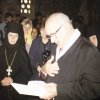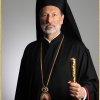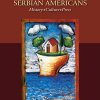In 2006, his widow, Mrs. Irene Enich (nee Miller), hoping to ensure "continuing access to and the preservation of" this valuable collection, donated the entire collection and related valuable personal notes of Steven Enich to the Hilandar Research Library, where these visual materials can embellish the largely Eastern (and Serbian) Cyrillic Orthodox manuscripts on microfilm, which this special collection preserves and to which it creates access as the largest such collection in the world.
The Hilandar Research Library gratefully acknowledges the generosity of Mrs. Irene Enich, as well as the work of a number of individuals at The Ohio State University Libraries, and especially: Amy L. McCrory, Digital Imaging Technician, OSU Libraries Preservation Department, and Jennifer Breitigan, student assistant to A. McCrory; Melanie B. Schlosser, Metadata Librarian, Scholarly Resources Integration Department; Morag E. Boyd, Metadata Librarian, Special Collections Cataloging Department. In addition, it should be noted that the difficult and time-consuming task of identifying the slides and their contents was divided between Dr. Lyubomira Parpulova Gribble, Assistant Curator of the Hilandar Research Library, and Andrew J. Kier, Graduate Research Associate of the Resource Center for Medieval Slavic Studies.
The Steven Enich Serbian Orthodox Culture Slide Collection
In honoring Mrs. Enich's wishes, the Hilandar Research Library, through the OSU Libraries and Knowledge Bank, makes images of the vast majority of these slides broadly available through the Knowledge Bank. In addition, the original notes of S. Enich are also available as scanned images. These images may be downloaded for private or academic use; for other use, please contact the This email address is being protected from spambots. You need JavaScript enabled to view it..
Collections in this community
- Church Items (Enich Slide Collection)
- Frescoes from Monasteries of Serbia (Enich Slide Collection)
- Good Friday and Easter, 1981 (Enich Slide Collection)
- Kalemegdan Fortress, Ruzica, and St. Petka (Enich Slide Collection)
- Life and Cathedral of St. Sava (Enich Slide Collection)
- Miscellaneous (Enich Slide Collection)
- Montenegro (Enich Slide Collection)
- Patriarchal Activities (Enich Slide Collection)
- Patriarchal Museum (Enich Slide Collection)
- Serbian Monasteries (Enich Slide Collection)
- St. Cyril and Methodius, St. John Kanty Church, Irene's House (Enich Slide Collection)
- Stara Serbia (Enich Slide Collection)
- Tesla, Military, and Public Museums (Enich Slide Collection)
- Theological Educational Facilities (Enich Slide Collection)
- Vidovdan (Enich Slide Collection)





